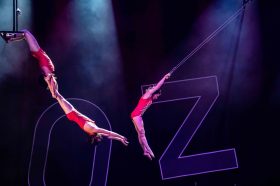Students come in all shapes and forms (Image: Dean Hochman, Flickr CC)
Degrees and diplomas have become something that many fit around an already busy schedule. As such, schools and universities are feeling the push to adapt, innovate and accommodate the needs of a wide-ranging set of learners.
Dr Egil Kipste, Head of Graduate Studies at NIDA has observed the increasing diversity of learners with applicants coming from varied backgrounds and experiences.
‘Our group of first-year actors in 2015 includes a 32 year-old mother, someone from France and a former refugee.’
Similarly at National Art School, Simon Cooper, Head of Studies said it’s not uncommon to find a diverse range of students in one program.
‘We are finding that there’s actually quite a broad demographic and range of people from 18 to 80 in our BFA and also a pretty broad gender split – we do have mums and dads along with younger people.’
This mixed demographic of the classroom sees a lot of sophisticated minds applying themselves to projects, adding value to the learning process, said Antony Waddington, tutor at Metro Screen.
‘It sets up an environment where a disparate group of skills are brought to bear and it also raises the bar in terms of everyone’s commitment and contribution with the training.’
Actor Jane Mahady, alumnus of Adelaide College of the Arts feels that different perspectives add to the experience of learning.
‘In my class our ages ranged from 17 to 33 and I think working with people from different age ranges is really fantastic because you find your use and your maturity by being around different energies and different cultures as well.’
The benefits of student diversity are clear, disparate demographics also present challenges. Here’s what arts education providers are doing to ensure students reach their full potential.
Flexibility & Support
Having a small intake of students is one way educationists are making sure students get proper support and attention.
‘We only take around 150 or so students in our BFA program each year – so with small class sizes we tend to know everybody and, most of our students feel supported and we are able to help people get through some of their challenges,’ said Cooper.
Margaret Spillane Internship Coordinator at Australian Institute of Music feels that a majority of students in music courses are quite focused due to prior study. ‘A number of them have started another degree, or are in their late 20s, early 30s with jobs and careers and realised that’s not what they wanted to do.’
She said opportunities to consult and talk to staff are laid open to students right from the start.
‘One of the things we encourage in our students is, if there are things going on in your life and you need to go part-time for a trimester or two, do that – be relaxed, comfortable, and not worried about being overwhelmed.’
Industry focus
Work placements and industry internships are experiences that prepare students to be ready for the job market. Ben Fitzgerald, Program Manager for Live Production, Theatre and Events, Graphic Design and Creative Industries at Box Hill TAFE said courses are designed to be industry-focussed at the institute.
‘We’ve got a 150-seat auditorium, apart from rehearsal spaces, smaller performance spaces, three Mac labs and on the fashion side, very well equipped pattern making rooms, equipment and facilities to really know how the industry works.’
He said that the students also do an overseas study tour each year.
‘Depending on whether it’s a degree or VET, it might be a study tour to Asia or Europe, where they get connected to the industry through that course and get skilled up with practical skills.’
Martin Harper, Co-Head of Acting at International Screen Academy (ISA) feels that, ‘a lot of institutions pump up the acting component’.
‘In my experience, having been in industry for 10 years, it short changes some people because they’ve got really good experience in terms of performing but have to really seek out the business aspects of performance, how do you produce, how do you create your own work.
In order to be ready to join the industry, as an actor, ‘ you should have an understanding of what else goes into the creative mix,’ said Harper.
Technology and Access
Having the ability to access education no matter where in the world you are is a gift that the digital revolution has bestowed.
Professor Gary McPherson, Director of the Melbourne Conservatorium of Music (MCM) said that the musicians and music teachers of the future will be teaching on the internet and cites the example of the iMCM project.
‘We’ve already got the iMCM, the internet Melbourne Conservatorium of Music, where we are teaching kids in rural areas either in string quartets or small groups or one-to-one lessons, because they simply don’t have access to specialist teaching in their town.’
Reaching remote communities and towns with online music lessons is an area of ongoing research for MCM said McPherson.
‘Because we are doing research in the area, we believe it’s viably important for the future of music that we connect much more closely with the community.
‘The composers, the performers, they’re using technology all the time in terms of rethinking how they would record music, how they would experience music and deal with music,’ he concluded.





